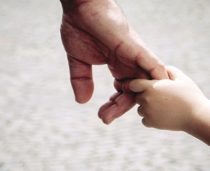There are people that we’re close to, but sometimes, we question that closeness. We question whether we’re able to connect or not. Sometimes, we feel the distance, and we feel the separation.
I want to talk about how to increase the connectedness, the love, the compassion, the empathy, and just the connection, the sense of presence that happens with others.
Here’s what I want to talk about. If we’re with someone, we feel like maybe they’re just running on in their own mind and not really connecting with us. We feel like we’re running on in our own minds and not really connecting with them.
The thing is this. Focusing on them probably isn’t going to help, and trying to figure out what they’re thinking probably isn’t going to help. What helps is I simply open myself. I open myself to them. I open myself to whatever is going on around me in a way, and I open myself to whatever is going on with them, and I open myself to whatever shared experience there is, and by being open, we have shared experience.
We’re both experiencing being in this place in time, so there is an experience of being in this place in time. That experience is shared in an overlapping way. There’s a term for this, please learn it and insert it here.
The experience is that of two circles that overlap a bit in the center, or maybe two circles that overlap one another largely. However, there is still some room for each individual circle outside of the part that overlaps.
In other words, instead of overlapping a little bit, maybe they overlap a lot. There is still that little sliver, like the new moon that little slice around the edges where the shadow of the earth overlaps the moon all but in this little sliver.
Identity is like that. What we have more of than identity as an individual is a shared sense of existence, a shared sense of presence, a shared spaciousness.
With this process, we’re looking to increase that shared space, and not looking to work on the details.
The details of the life are not typically shared.
However, we often know is someone suffering, is someone celebrating, is someone sad, is expectant.
We know what kind of state they’re in. So that being the case, we can then sense that in the connection. So we’re connected. We’re 95% the same experience, 5% of whatever is happening in the individual bodies. We can infer, or sense, or guess at what kind of state of mind the other person is in.
Then we can kind of open ourselves to that experience, not because we’re taking the experience, not necessarily because we’re taking it on. We simply want the other person to know that the connection and appreciation is substantial.
It’s deeper than what might be superficial, and one of the ways that we can do that is by sharing our experience. If someone is scared, we can allow that sense of fear to be present in the interaction at least while it’s still there.
The way feelings are always changes. They’re constantly changing, so even someone who’s scared, they might say, “Well I’m scared, I’m totally scared. I’m always scared. This situation is scaring me and I’ve got fear all the time.” That could be, in a way.
There could be a sense of returning to the fear regularly, that sort of thing. There could be just a general sense of fear.
There’s a lot of things going on, but the person isn’t focused on the fear all the time. If they were, that would drive them crazy.
Well okay, even if it’s driven them crazy, they still can’t focus on the fear all the time. So the thing about that is they have to focus on the crazy part at the time. “I’m afraid, oh my god, look what this fear is doing to me! Look at what it is doing to me. Oh, look, I’m experiencing all of these things, my chest is tight, and it’s all about the fear.”
When they’re experiencing all of those things, they’re not actually experiencing the fear. They’re maybe experiencing the results of the fear. The fear that they were feeling initially, with the pictures and the thoughts and the words that go with it and all that stuff, doesn’t necessarily linger through the analysis of what they’re feeling.
It might be reinforced by it. In other words, the feelings are repeated, and when someone is in a fear state, the sense of fear will come up and then it will fade. Then, it will rise again and fade, and rise again and fade.
It’ll just go through all those cycles.
I think that this is important stuff to recognize. The fear doesn’t necessarily escape or completely fade, because the rational for the fear persists.
That’s like the legs that the fear is propped up on. It’s put up on this rational.
Once we have the rational, we can continue to experience the fear on a repeated basis. However, the fear itself will come and go.
The actual experience of fear will come and go, although some of the residual things may remain in effect. If there’s a tension in certain parts of the body that may remain, even after the sensation of fear has passed, the tension may continue on and it may become habituated.
Sometimes, there are side effects. If the side effects of the fear become habituated, they can easily trigger the recurrence of fear, although probably on different topics.
Nevertheless, the return of fear will happen because of the habituated symptoms.

















